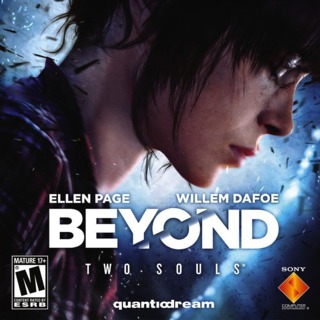The commitment of Quantic Dream to make a game like this work is so admirable that it’s hard not to like Beyond: Two Souls. Even though there is plenty of variety to be found within the video game industry, it’s still rare that a big budget game, published by one of the industry leaders, can be so nontraditional. Though that’s not to say Beyond is good or even an acceptable work only because it is more experimental rather than actually achieving a quality experience. It does, however, make its shortcomings a little easier to overcome.

In the most traditional sense of the word, Beyond is the best “game” to have come from David Cage’s studio. Working off of the same elements created in Heavy Rain and Indigo Prophecy before it, Beyond progresses into a much tighter and more focused gameplay experience. Character movement is vastly improved, as is the difficulty and frequency of quick-time events. The change to limit QTEs and how tough they often were in previous games makes for a better overall experience. And when the player does fail, the bridge between success and failure is often softened. If I missed a punch or failed to block a ghost from attacking, it felt like I was given more leeway or another chance in the same scene. I could get back up from my failure and then have another chance. This helps from repeating the same scene over and over again, and it’s a welcome change for a game that focuses on narrative.
Playing as Aiden, the spirit connected to Jodie throughout the game, plays a pivotal part in much of the gameplay. His role is particularly prevalent in both combat and the more traditional adventure elements. Jodie is often tasked with overcoming specific things that are impossible by herself. These may be simple tasks like breaking open a locked door or more complex paranormal activities like possessing another person’s body and taking complete control over them. The actual movements required to perform most of these actions are simple and require no more than a couple movements on the joysticks. Being able to control the spirit physically also leads to having more control of how you interact with Jodie and how you establish the relationship between these two interlocked souls. The cohesiveness to freely switch between the characters and having them both work together is a novel idea that’s executed well throughout the game.
The narrative that plays out in Beyond is best summarized as disjointed. The overlying story is told in a timeline that jumps from different, non sequential stages of Jodie’s life. In one scene you may be carrying out a covert operation for the CIA, and in the very next you could find yourself as a child playing in the backyard. In the beginning it’s a bit confusing as to why they chose this specific style to tell the story, but by the end I feel as if it worked for the game. Doing big action oriented missions in the later part of the timeline and then being able to fill in more back story as to who Jodie is made for a surprisingly cohesive experience.

Even for a game about ghosts and the paranormal world, the overarching story is something that will take tremendous suspension of belief at times. The more action oriented sequences take place in settings like Somalia, an arctic military base, and a Navajo Indian village. The deeper the game goes into the timeline, the harder it will be to overcome some of the set piece sequences which may be nonsensical or drag on for too long. The best bits come from Jodie’s interaction with Aiden as a child, as we get to peer into how she copes with having this entity with her. Additionally, seeing the relationship between the two progress leads to some of the more interesting and worthwhile parts of the narrative. If nothing else, the progression from one scene to the next will certainly keep you interested as the story unfolds. There are a lot of highs and a lot of lows, and you’ll almost assuredly have your favorite parts as well as easily identifiable low points of the game’s story.
Arguably the biggest jump in progression from previous Quantic Dream games to Beyond is the acting. The technology used to capture every single detail of the character’s face is simply fantastic and it really helps lead to the believability of the performance. There’s no real weak point in any one character. Ellen Page as the leading protagonist is excellent throughout and displays a lot of flexibility in the way she portrays Jodie from a teenager into her adult years. It will be hard not to fall in love with her character because her emotions and feelings are captured so well. Even with some odd story sequences, the way in which the characters give their performances makes everything enjoyable while in the moment. And for a game that’s so heavily invested in these characters, it’s not only the biggest change, but the most important one as well.

The rich voice acting is not the only strong piece of audio in the game. The soundtrack is really good and I particularly liked the menu music. Aside from the sensational mo-cap, the game is also visually impressive. The environments are rich and colorful and the game runs really well without any frame-rate dips. Occasionally, there would be a bit of a hiccup when the game was loading into a new area. I only encountered this a few times and it is not a huge detractor from the game’s overall performance. Altogether, Beyond is an exceptional example of how audio and visuals can be used to enrich an experience.
Despite the fact that I can honestly say that I enjoyed the experience of playing Beyond: Two Souls, it’s hard to give a universal recommendation given how divisive the game is. Those who enjoyed previous Quantic Dream games will definitely find a likable experience with Beyond. Those who were turned off by the nontraditional gameplay and emphasis on story in the previous titles probably won’t find much here to convince them otherwise.

As it sits, Beyond is an acknowledgement that sticking with what you know, and improving on the mechanics you’ve created, is not necessarily a bad thing. From almost every perspective, Beyond is the best game created by Cage and his team, and while I wouldn’t say they have perfected the formula, they’ve carved out a really nice niche for themselves. Whatever you want to call Beyond – a game, a movie, or an interactive experience, I enjoyed it. Count me in for the next Quantic Dream game.

